module9_unit1_Will_computers_to_be_used_more_than_books_in_the_future
- 格式:ppt
- 大小:5.51 MB
- 文档页数:31
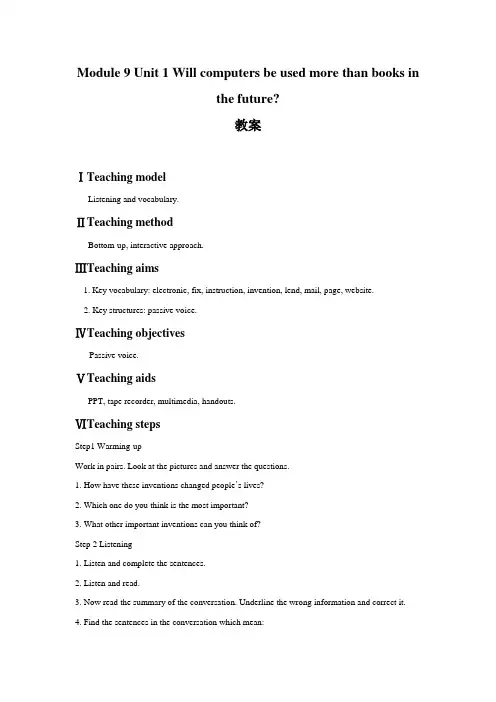
Module 9 Unit 1 Will computers be used more than books inthe future?教案ⅠTeaching modelListening and vocabulary.ⅡTeaching methodBottom-up, interactive approach.ⅢTeaching aims1. Key vocabulary: electronic, fix, instruction, invention, lend, mail, page, website.2. Key structures: passive voice.ⅣTeaching objectivesPassive voice.ⅤTeaching aidsPPT, tape recorder, multimedia, handouts.ⅥTeaching stepsStep1 Warming-upWork in pairs. Look at the pictures and answer the questions.1. How have these inventions changed people’s lives?2. Which one do you think is the most important?3. What other important inventions can you think of?Step 2 Listening1. Listen and complete the sentences.2. Listen and read.3. Now read the summary of the conversation. Underline the wrong information and correct it.4. Find the sentences in the conversation which mean:1) Changing the subject, can I get the camera?2) It is not a problem. I will use another memory card.3) I will do what you tell me to do.5. Answer the questions.1) How do you fix a camera if the memory card is full?2) When do you need to read the instructions?3) How often do you send message by mail?4) How many pages does this book have?5) Which website do you often go to when you get online?6) What is an example of electronic technology?7) When you lend something to someone, what do they have to do later?8) What do you think is the most important invention in human history?Step 3 Pronunciation and speaking1. Listen and mark the pauses.1) They’ll be put up on the school website. And they can be seen on the Internet by other classes, even people living in other countries.2) You must promise that you’ll take good care of it.2. Now listen again and repeat.Step 4 Work in pairsTalk about the advantages of these inventionsExample:A: We can use email to send messages.B: Yes, we can use email to send message quickly and cheaply.Step 5 HomeworkFinish the exercises in the workbook.。
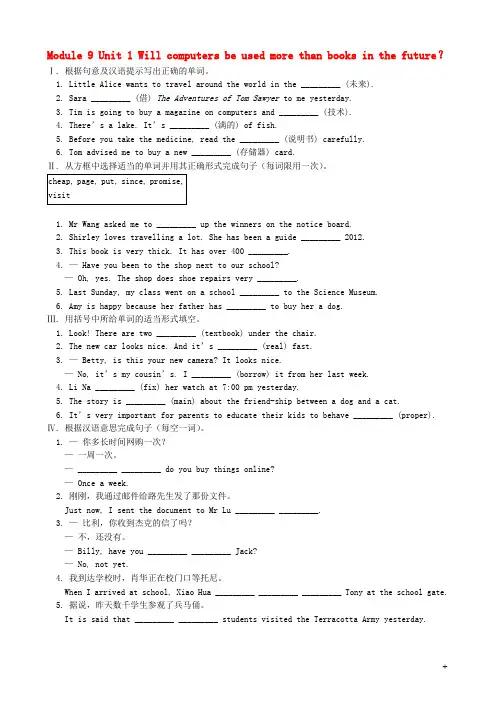
Module 9 Unit 1 Will computers be used more than books in the future?Ⅰ. 根据句意及汉语提示写出正确的单词。
1. Little Alice wants to travel around the world in the _________ (未来).2. Sara _________ (借) The Adventures of Tom Sawyer to me yesterday.3. Tim is going to buy a magazine on computers and _________ (技术).4. There’s a lake. It’s _________ (满的) of fish.5. Before you take the medicine, read the _________ (说明书) carefully.6. Tom advised me to buy a new _________ (存储器) card.Ⅱ. 从方框中选择适当的单词并用其正确形式完成句子(每词限用一次)。
1. Mr Wang asked me to _________ up the winners on the notice board.2. Shirley loves travelling a lot. She has been a guide _________ 2012.3. This book is very thick. It has over 400 _________.4. — Have you been to the shop next to our school?— Oh, yes. The shop does shoe repairs very _________.5. Last Sunday, my class went on a school _________ to the Science Museum.6. Amy is happy because her father has _________ to buy her a dog.Ⅲ. 用括号中所给单词的适当形式填空。
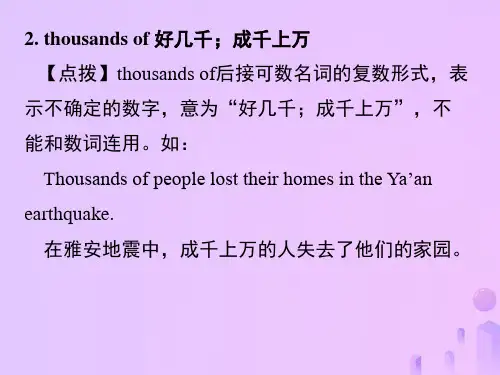
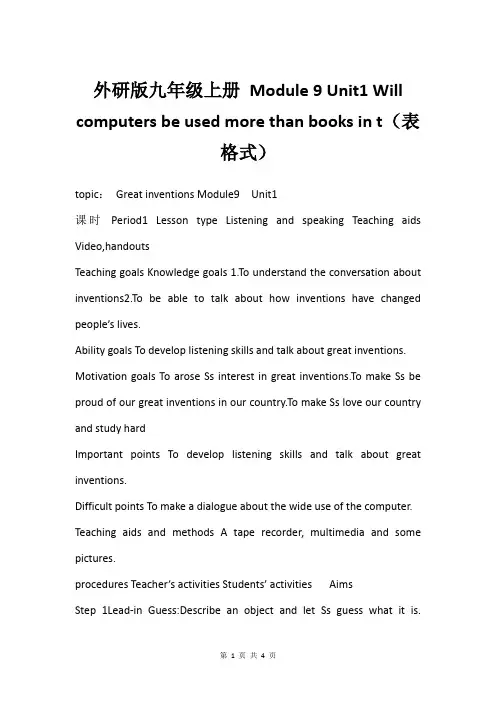
外研版九年级上册Module 9 Unit1 Will computers be used more than books in t(表格式)topic:Great inventions Module9 Unit1课时Period1 Lesson type Listening and speaking Teaching aids Video,handoutsTeaching goals Knowledge goals 1.To understand the conversation about inventions2.To be able to talk about how inventions have changed people’s lives.Ability goals To develop listening skills and talk about great inventions. Motivation goals To arose Ss interest in great inventions.To make Ss be proud of our great inventions in our country.To make Ss love our country and study hardImportant points To develop listening skills and talk about great inventions.Difficult points To make a dialogue about the wide use of the computer. Teaching aids and methods A tape recorder, multimedia and some pictures.procedures Teacher’s activities Students’ activities AimsStep 1Lead-in Guess:Describe an object and let Ss guess what it is.AirplaneWashing machineCameraReview the new words. Let students learn about inventions.Step 2Presen-tation Present pictures of some inventions and let Ss say who invented them and when. let Ss say who invented them and when.paper printingBi Sheng Cai Lun105 A. pass the 11th centurygunpowderthe 9th centuryCar steam engine Karl Benz James Wattin 1885 in 1776 Let studentsknow about some inventions.Step 3Look and say. Ask Ss to look at the pictures in Activity 1 and answer three questions. 1.How have these inventions changed people’s lives 2.Which one do you think is the most important 3.What other important inventions can you think of Learn about inventions and People’slife.Step 4Listen-ing. Ask Ss to listen and complete the sentences. 1.Lingling loves her mobile phone because she can ________________.2. All of Daming’s friends’ numbers are ______ in his phone.3. Today’s cameras are better than old cameras because they do not ________ and the photos can _______________.4. Lingling thinks everything ___________ by computers to some degree, so the computer is ____________ invention. Develop theStudents’Listening.Step 5Look and say. Pair work. Present three pictures and ask Ss to make a dialogue to talk about one invention. A: Which of theseinventions do you think is the most important B: I think … is the most important.A: Why B: Because it … Talk about oneInvention.Step 6Reading sk Ss to listen to the conversation and answer some questions. 1. Why does Tony want to borrow his father’s camera 2. Who bought the camera Why Learn about the main ideas of the passage.Step 7Everyday English Ask Ss to learn about the Everyday English I wonder …Perhaps.Here it is.Promise! Learn the Everyday English.Step 8Reading Complete Activity 3.Read the summary of the conversation. Underline the wrong information and correct it. Tony wants to borrow his father's camera and take some photos of the school dance and the basketball match. The photos will be shown in the school magazine. Tony's dad lends the camera. He promises Tony to look after it. Get the correct ideas from the passage and tell the true or false part of the sentences.Step 9Reading Find the sentences in the conversation which mean.1.Changing the subject, can I get the camera2.It is not a problem. I will use another memory card.3.I will do what you tell me to do. Find the same meaning of the sentences from the conversation.Step 10 Acting The best voice: Ask Ss to read the dialogue without the voice. Ss read the dialogue and have a competition.Step 11Discussion Work in pairs. Talk about the advantages of theseinventions. Email mobile phone TV washing machine1.--We can use mobile phones to contact others.--Yes, we can talk with anyone at any time.2.—We can use TV to get a lot of information. --Yes, we can use TV to know what is happening in Other places.3.—We can use washing machine to wash our clothes. --We can easily make our clothes clean. Practise talking about the advantages of the inventionsStep 14Homework Choose one invention and describe how it has changed your life. Practice the students’ writing.Teaching reflection。
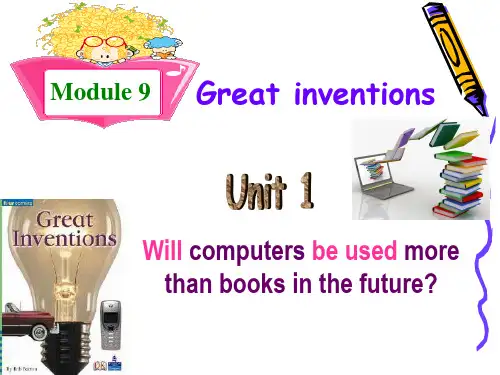
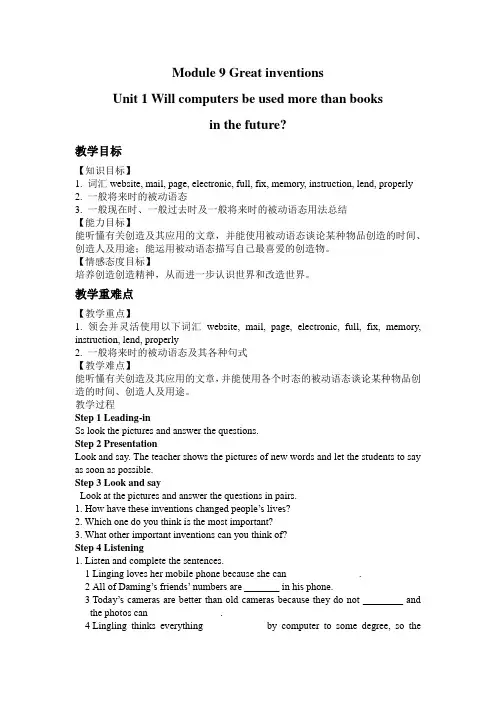
Module 9 Great inventionsUnit 1 Will computers be used more than booksin the future?教学目标【知识目标】1. 词汇website, mail, page, electronic, full, fix, memory, instruction, lend, properly2. 一般将来时的被动语态3. 一般现在时、一般过去时及一般将来时的被动语态用法总结【能力目标】能听懂有关创造及其应用的文章,并能使用被动语态谈论某种物品创造的时间、创造人及用途;能运用被动语态描写自己最喜爱的创造物。
【情感态度目标】培养创造创造精神,从而进一步认识世界和改造世界。
教学重难点【教学重点】1. 领会并灵活使用以下词汇website, mail, page, electronic, full, fix, memory, instruction, lend, properly2. 一般将来时的被动语态及其各种句式【教学难点】能听懂有关创造及其应用的文章,并能使用各个时态的被动语态谈论某种物品创造的时间、创造人及用途。
教学过程Step 1 Leading-inSs look the pictures and answer the questions.Step 2 PresentationLook and say. The teacher shows the pictures of new words and let the students to say as soon as possible.Step 3 Look and sayLook at the pictures and answer the questions in pairs.1. How have these inventions changed people’s lives?2. Which one do you think is the most important?3. What other important inventions can you think of?Step 4 Listening1. Listen and complete the sentences.1 Linging loves her mobile phone because she can ______________.2 All of Daming’s friends’ numbers are _______ in his phone.3 Today’s cameras are better than old cameras because they do not ________ andthe photos can ______________.4 Lingling thinks everything ___________ by computer to some degree, so thecomputer is __________________ invention.2. Listen to Part 3 and answer the following questions.1. What will Tony do on the school visit to the museum?2. Where did we get mainly information in the past?Step 5 Reading1.Find out the sentences which belong to the passive voice in the dialogue.1. They’ll be put up on the school website.2. And they can be seen on the Internet by other classes.3. Will computers be used more than books in the future?2.Now read the summary of the conversation. Underline the wrong information and correct it.Tony wants to borrow his father’s camera and take some photos of the school dance and the basketball match. The photos will be shown in the school mag azine. Tony’s dad lends the camera. He promises Tony to look after it.3.Find the sentences in the conversation which mean:1 Changing the subject, can I get t he camera?2 It is not a problem. I will use another memory card.3 I will do what you tell me to do.4Answer the questions.electronic fix instruction invention lend mail page website1 How do you fix a camera if the memory is full?2 When do you need to read the instructions?3 How often do you send messages by mail?4 How many pages does this book have?5 Which website do you often go to when you get online?6 What is an example of electronic technology?7 When you lend something to someone, what do they have to do later?8 What do you think is the most important invention in human history?Step 6 Everyday EnglishLet Ss say the everyday English that they have learnt in the passage.•I wonder …•Perhaps.•Here it is.•Promise!Step 7 Language points1. Can I borrow your camera?borrow表示“借入〞lend表示“借出〞borrowsth. from sb. 表示“向某人借某物〞。
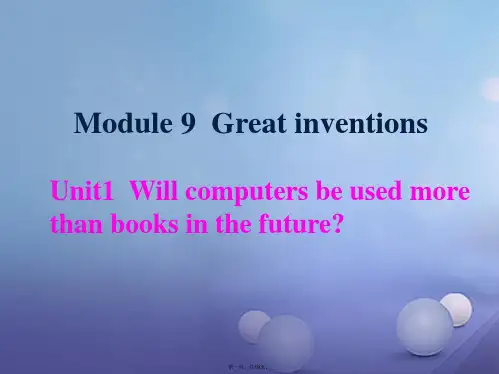
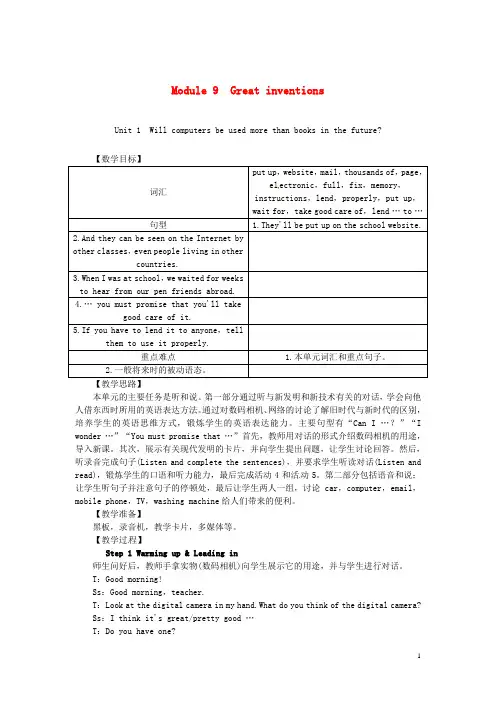
Module 9 Great inventionsUnit 1Will computers be used more than books in the future?el【教学思路】本单元的主要任务是听和说。
第一部分通过听与新发明和新技术有关的对话,学会向他人借东西时所用的英语表达方法。
通过对数码相机、网络的讨论了解旧时代与新时代的区别,培养学生的英语思维方式,锻炼学生的英语表达能力。
主要句型有“Can I …?”“I wonder …”“You must promise that …”首先,教师用对话的形式介绍数码相机的用途,导入新课。
其次,展示有关现代发明的卡片,并向学生提出问题,让学生讨论回答。
然后,听录音完成句子(Listen and complete the sentences),并要求学生听读对话(Listen and read),锻炼学生的口语和听力能力,最后完成活动4和活动5。
第二部分包括语音和说;让学生听句子并注意句子的停顿处,最后让学生两人一组,讨论car,computer,email,mobile phone,TV,washing machine给人们带来的便利。
【教学准备】黑板,录音机,教学卡片,多媒体等。
【教学过程】Step 1 Warming up & Leading in师生问好后,教师手拿实物(数码相机)向学生展示它的用途,并与学生进行对话。
T:Good morning!Ss:Good morning,teacher.T:Look at the digital camera in my hand.What do you think of the digital camera?Ss:I think i t's great/pretty good …T:Do you have one?Ss:Yes,I do./No,I don't.T:Now 1 will show you how to use it ….Then,the photos will be put up on the school website.They can be seen by all of the students,even people living in other countries …活动小结:教师通过与学生自由谈论数码相机导入新课的学习,并在对话的过程中有意识地加入对话中的句子和被动语态,既活跃了课堂气氛,也能让学生比较迅速地进入到学习状态中,提前熟悉新课的内容。